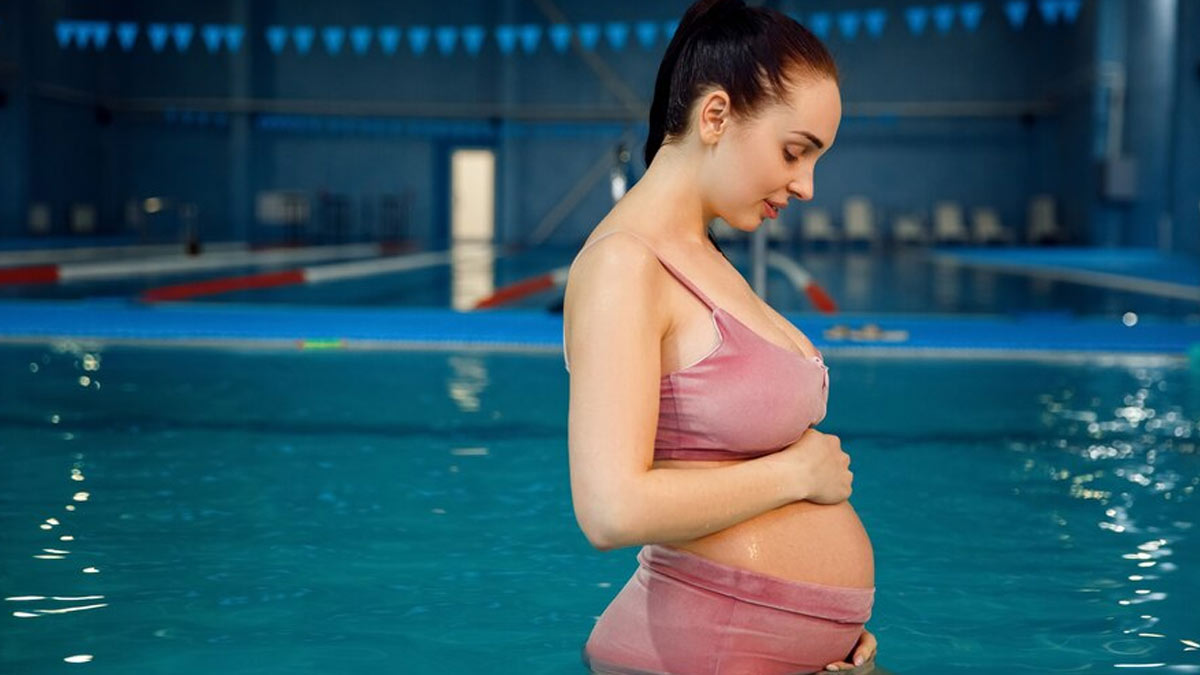
Swimming is a low-impact exercise that is often advised in pregnancy as it is both safe and beneficial. The benefits of this activity are manifold and help pregnant women to stay active, improve their cardiovascular health and relieve common pregnancy discomforts. However, there are some precautions and guidelines that should be followed to ensure the safety of both the mother and the baby. We spoke to our expert Dr Jayati Mondal, Consultant IVF Specialist, Renew Healthcare, Kolkata, who explained how swimming helps during pregnancy and the precautions to be taken.
Table of Content:-
Benefits of Swimming During Pregnancy
According to the American College of Obstetricians and Gynecologists (ACOG), it is safe to continue or initiate regular physical activity if you are healthy and your pregnancy is progressing normally. Exercise does not increase the risk of miscarriage, low birth weight, or premature delivery.

Low-Impact Exercise
Swimming is a low-impact exercise that is gentle on the joints and muscles, making it safe for pregnant women. It improves cardiovascular fitness, muscle strength, and flexibility but doesn’t put excessive strain on the body.
Relieves Discomforts
“Swimming can alleviate common pregnancy discomforts, such as back pain, swelling and fatigue. The buoyancy of water can help support the baby's weight and relieve pressure on the spine, thus providing relief from back pain,"said Dr Mondal.
Swimming also improves circulation and helps to reduce swelling in the legs and ankles. Swimming also makes the muscles supple and avoids the accumulation of lactic acid. This considerably reduces muscle cramps at night.
Also Read: First Trimester Of Pregnancy: Expert Explains Transformations To Expect During This Phase

Improves Mood and Mental Well-Being
Exercise and swimming release endorphins, which are mood-elevating hormones. Swimming thus reduces stress, anxiety and depression and improves the overall mental well-being of pregnant women.
Promotes Better Sleep
Regular exercise, including swimming, helps improve sleep quality during pregnancy. It tires out the body in a healthy way, making it easier to fall asleep at night and stay asleep throughout the night.
Precautions For Swimming During Pregnancy

Consult With Your Healthcare Provider
Before starting any exercise routine, including swimming, it is important to consult with your healthcare provider or obstetrician. They can provide personalised recommendations based on your individual health and pregnancy status.
Stay Hydrated
“It is essential to maintain hydration before, during, and after swimming. Dehydration leads to overheating and potential complications for both the mother and the unborn child," added Dr Mondal.
Avoid Diving and Jumping
Pregnant women should avoid diving and jumping into the pool to avoid injury and strain on the abdominal muscles. It's best to stick to gentle swimming strokes and avoid any sudden movements.
Avoid Overheating
“Pregnant women are prone to heat stress, so it is important to pay attention to your body temperature while swimming. Avoid overheating by staying in well-ventilated areas, taking frequent breaks and staying hydrated," said Dr Mondal.
Also Read: Second Trimester Of Pregnancy: Expert Explains Symptoms, Diet, and Exercise
Look Out for Hygiene
Avoid pools with excessively high chlorine levels and unhygienic conditions that can adversely affect the health of pregnant mothers and transmit infections as well.
Listen to your Body
Pregnancy can affect your energy levels and physical abilities. Hence, pay attention to your body and adjust your swimming routine as needed. If you experience any discomfort, pain, or unusual symptoms, stop swimming and consult your healthcare provider.
Bottomline
Dr Mondal concluded, “Swimming is generally safe and beneficial during pregnancy. It helps pregnant women to stay active, relieve discomforts and improve overall well-being. By following precautions and guidelines, pregnant women can enjoy the numerous benefits of swimming and ensuring the safety of themselves and their baby at the same time.”
[Disclaimer: This article contains information provided by an expert and is for informational purposes only. Hence, we advise you to consult your expert if you are dealing with any health issues to get the necessary treatment.]
Also watch this video
How we keep this article up to date:
We work with experts and keep a close eye on the latest in health and wellness. Whenever there is a new research or helpful information, we update our articles with accurate and useful advice.
Current Version